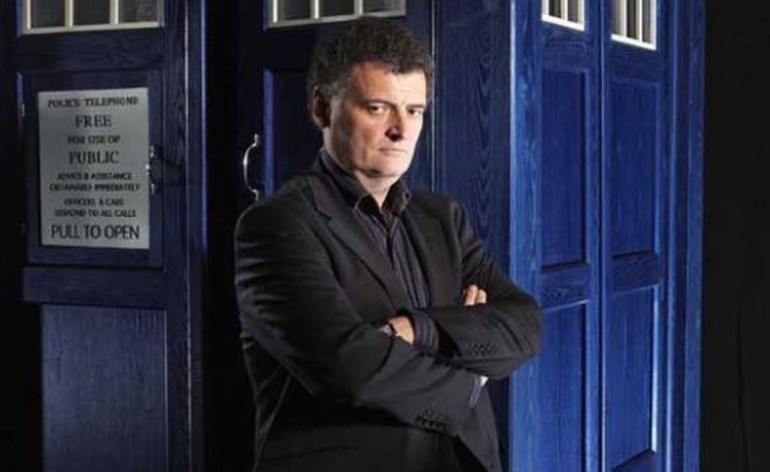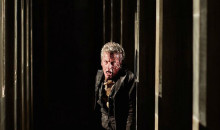Steven Moffat is Leaving Doctor Who
After Season 10 of Doctor Who, Steven Moffat is leaving the program as showrunner.
Many fans have been waiting for this news for quite some time. According to Radio Times, his successor will be Chris Chibnall: the original head writer and co-producer of the dark and diverse Doctor Who spin-off and science-fiction program Torchwood and the crime drama Broadchurch. From this alone, particularly his work on Torchwood, Chibnall seems to have promise but let’s let the other fact sink in for a little while longer.
Steven Moffat is leaving Doctor Who.
A lot of things have been said about Steven Moffat over the years. Some people believe he made Doctor Who a world-wide phenomenon. Others believe he has nearly destroyed the franchise. Some say he is an excellent writer, others believe that he has been a terrible showrunner, and still more look at him and think he is yet another casualty of “fan-fickleness.”
I know I have had my own opinion about his writing and showrunning: particularly with regards to The Doctor’s late and latest Companion Clara Oswald. But let me try, from albeit a biased fan perspective, to explain why so many fans have issues with Steven Moffat’s sense of direction.
When Russell T. Davies took up the mantle of showrunner and head writer for Doctor Who, he focused on the diverse elements inherent in the show. He looked at the future, at all the different kinds of futures, and wrote into it sexuality and gender and wonder that could never have really been explored on television in the eighties or nineties. But more than that, he took the old elements of the show — the aspects that made it Doctor Who — and built on them to tell new stories: new character-driven stories. Davies was in turns darkly Byronic and wonderful, managing to intermix the sublimely ridiculous, and the dead serious into something captivating and relatable to viewers. It was this tight, clock-work narrative of golden gears in darkness with baubles of pure delight.
Of course, Davies wasn’t without his flaws. Sometimes he did get overwrought and overly complicated. Certainly, the emotional and character cop-out that was the end of “Journey’s End” comes to mind: perhaps illustrating that it was time for Davies to move on.
Steven Moffat was Davies’ successor. He started off in Doctor Who, like Chibnall, as a writer. And he is a good one. Certainly he is an excellent monster-maker when you look at the empty children in “The Empty Child” and “The Doctor Dances,” along with the Weeping Angels introduced in the masterfully told episode “Blink.” He has also introduced the dynamic and omnisexual characters of Captain Jack Harkness and Professor River Song into the Whoniverse. And this doesn’t even include the addition of Madame Vastra, the Silurian lady detective in the nineteenth century, her wife and maid Jenny, and … Strax. Yes: Mr. Potato-Head Homicidal Sontarian himself.
So Moffat could tell some good stories. Certainly, his reintroduction of a certain Missy, the episode of “Listen” and most of his previous Season Nine can attest to that. Unfortunately, by the time Davies left Doctor Who, Moffat’s role of showrunner became another matter entirely.
By this point, the tightly gear-oriented narrative structure of Davies is punctured, literally, with tears in time. Inconsistencies between stories and continuity get explained away by it all being the result of time-travel instead of sloppy story-telling. Character arcs and story ideas that could have been excellent in one or a few episodes, Moffat’s excellent self-contained mini-arcs for which he is so known, become dragged out and thin. Even the transitions between episodes — Doctor Who “Day of The Doctor,” I’m looking at you — are widened and viewers find themselves having previous events explained to them, instead of shown. It is the old “show, don’t tell” sin played all across space and time.
And this isn’t even including the “Mary Suing” that becomes more prevalent: especially in the form of Clara Oswald who is alternatively an extension of The Doctor’s character or an inconsistently-portrayed excuse of a human being instead of her own unique self. There is definitely a marked change from how Davies handled diversity and character development in the overall program to how Moffat dealt with these elements.
In the end, the best way to explain what happened to Steven Moffat is to make a bad geek analogy. Think about the original Star Wars trilogy: when George Lucas’ ideas and outlines were fleshed out and tempered by Lawrence Kasdan’s writing, Marcia Griffin’s film and cinematic work, and Gary Kurtz’s assistance. Now think about the Prequel Trilogy: where George Lucas’ former collaborators were all gone and there was no one else to reign in his ideas. Perhaps the most charitable thing to say is that Steven Moffat acts like the George Lucas of Doctor Who.
Take from that what you will.
My own conclusions are pretty clear. I liked Steven Moffat as a writer, for the most part, but as a showrunner he, at best, had a hit or miss direction in Doctor Who: becoming more of the latter with regards to using a character who had might as well be his own particular Jar Jar Binks. All that said, it is good to see that there will be a new showrunner and I hope that Chris Chibnall will be up to the task of playing in the sandbox that is bigger on the inside.
Be prepared to have to wait in order to see Doctor Who again. We will get one Christmas episode this year, and then Season 10 in 2017: Steven Moffat’s last.







